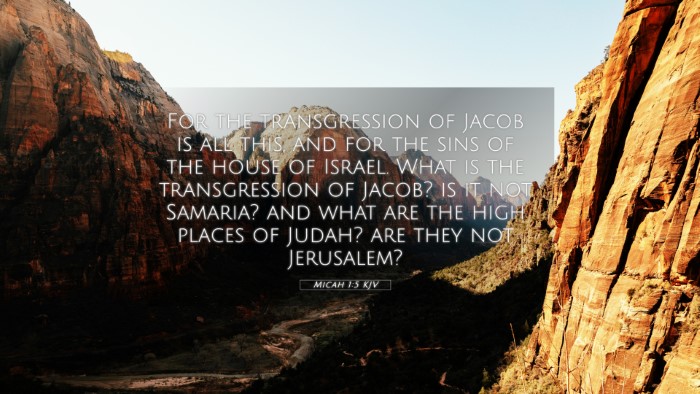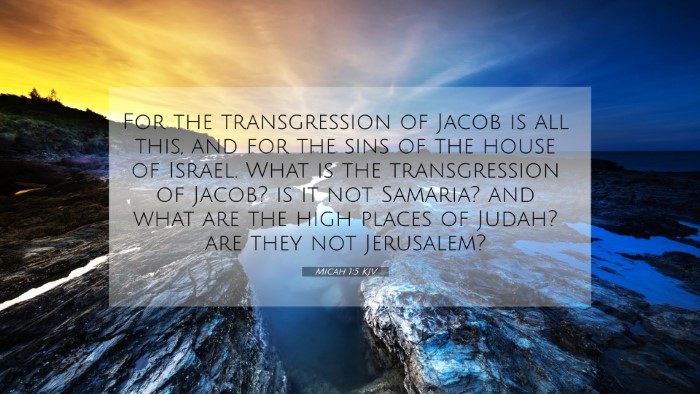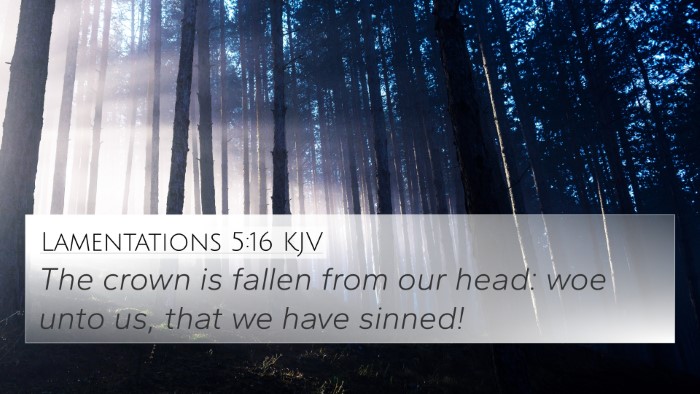Old Testament
Genesis Exodus Leviticus Numbers Deuteronomy Joshua Judges Ruth 1 Samuel 2 Samuel 1 Kings 2 Kings 1 Chronicles 2 Chronicles Ezra Nehemiah Esther Job Psalms Proverbs Ecclesiastes Song of Solomon Isaiah Jeremiah Lamentations Ezekiel Daniel Hosea Joel Amos Obadiah Jonah Micah Nahum Habakkuk Zephaniah Haggai Zechariah MalachiMicah 1:5 Similar Verses
Micah 1:5 Cross References
For the transgression of Jacob is all this, and for the sins of the house of Israel. What is the transgression of Jacob? is it not Samaria? and what are the high places of Judah? are they not Jerusalem?
Uncover the Rich Themes and Topics of This Bible Verse
Listed below are the Bible themes associated with Micah 1:5. We invite you to explore each theme to gain deeper insights into the Scriptures.
Micah 1:5 Cross Reference Verses
This section features a detailed cross-reference designed to enrich your understanding of the Scriptures. Below, you will find carefully selected verses that echo the themes and teachings related to Micah 1:5 KJV. Click on any image to explore detailed analyses of related Bible verses and uncover deeper theological insights.
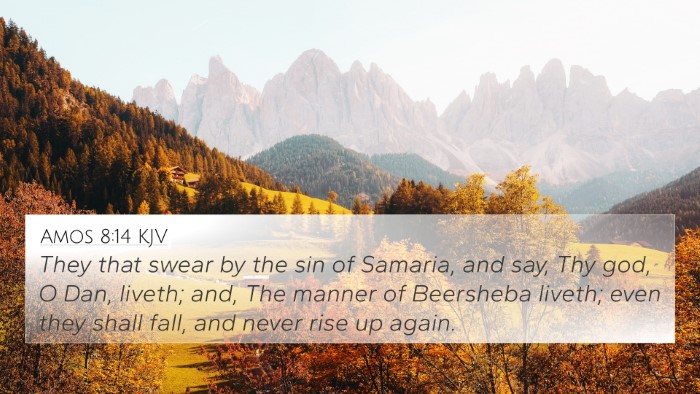
Amos 8:14 (KJV) »
They that swear by the sin of Samaria, and say, Thy god, O Dan, liveth; and, The manner of Beersheba liveth; even they shall fall, and never rise up again.
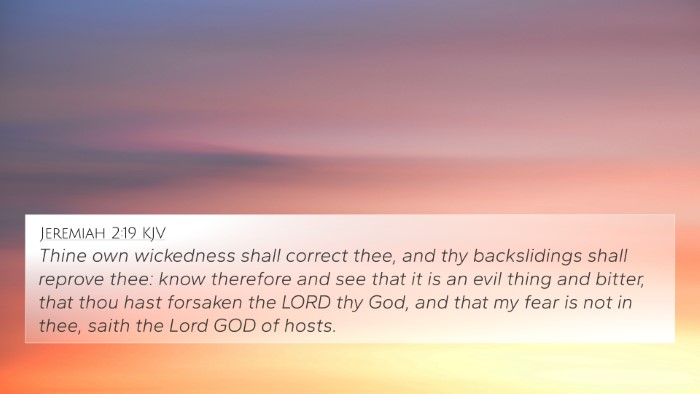
Jeremiah 2:19 (KJV) »
Thine own wickedness shall correct thee, and thy backslidings shall reprove thee: know therefore and see that it is an evil thing and bitter, that thou hast forsaken the LORD thy God, and that my fear is not in thee, saith the Lord GOD of hosts.
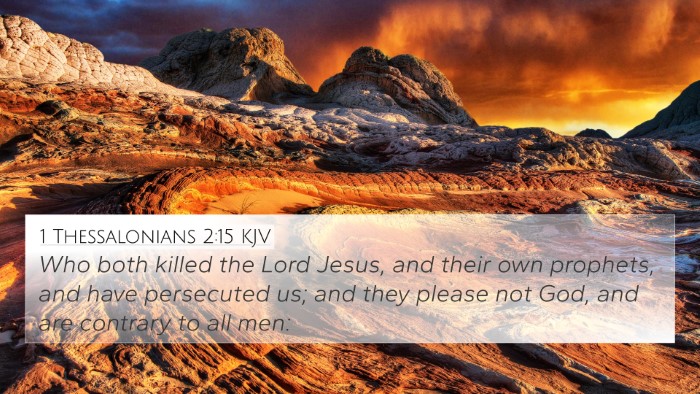
1 Thessalonians 2:15 (KJV) »
Who both killed the Lord Jesus, and their own prophets, and have persecuted us; and they please not God, and are contrary to all men:

Jeremiah 2:17 (KJV) »
Hast thou not procured this unto thyself, in that thou hast forsaken the LORD thy God, when he led thee by the way?
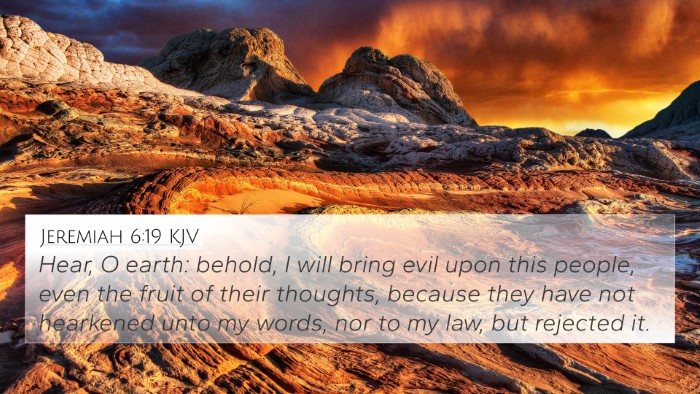
Jeremiah 6:19 (KJV) »
Hear, O earth: behold, I will bring evil upon this people, even the fruit of their thoughts, because they have not hearkened unto my words, nor to my law, but rejected it.
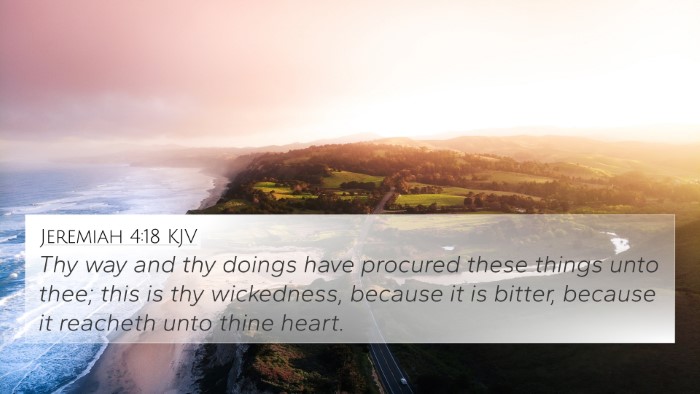
Jeremiah 4:18 (KJV) »
Thy way and thy doings have procured these things unto thee; this is thy wickedness, because it is bitter, because it reacheth unto thine heart.

Isaiah 59:1 (KJV) »
Behold, the LORD's hand is not shortened, that it cannot save; neither his ear heavy, that it cannot hear:
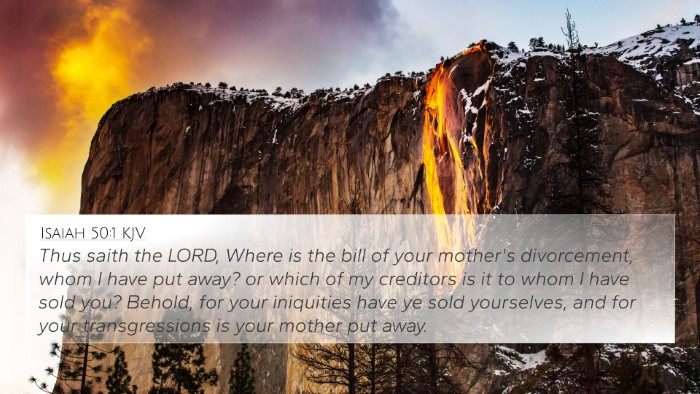
Isaiah 50:1 (KJV) »
Thus saith the LORD, Where is the bill of your mother's divorcement, whom I have put away? or which of my creditors is it to whom I have sold you? Behold, for your iniquities have ye sold yourselves, and for your transgressions is your mother put away.
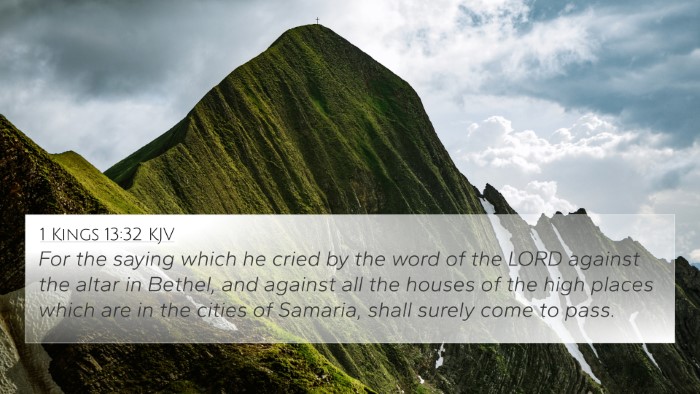
1 Kings 13:32 (KJV) »
For the saying which he cried by the word of the LORD against the altar in Bethel, and against all the houses of the high places which are in the cities of Samaria, shall surely come to pass.
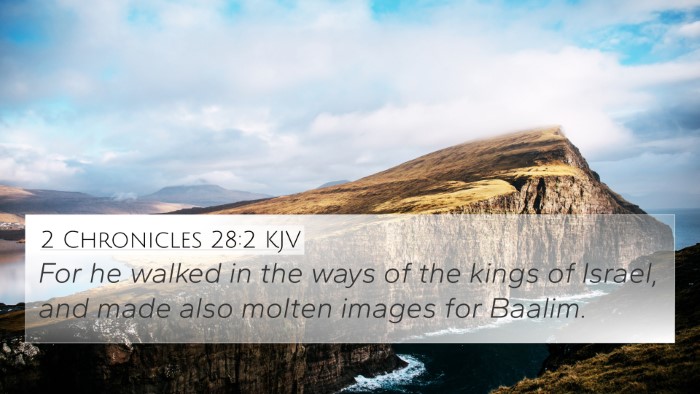
2 Chronicles 28:2 (KJV) »
For he walked in the ways of the kings of Israel, and made also molten images for Baalim.

2 Chronicles 28:23 (KJV) »
For he sacrificed unto the gods of Damascus, which smote him: and he said, Because the gods of the kings of Syria help them, therefore will I sacrifice to them, that they may help me. But they were the ruin of him, and of all Israel.
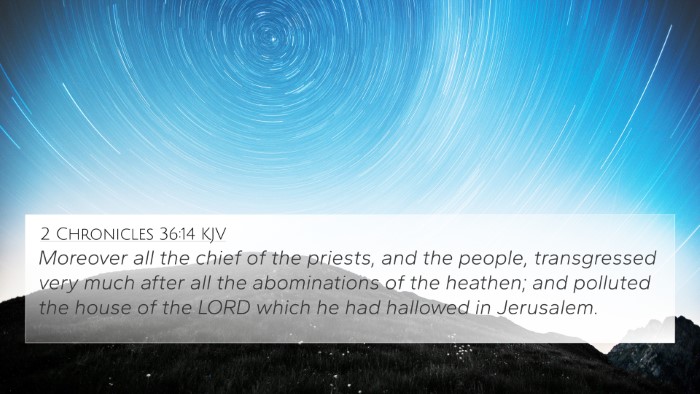
2 Chronicles 36:14 (KJV) »
Moreover all the chief of the priests, and the people, transgressed very much after all the abominations of the heathen; and polluted the house of the LORD which he had hallowed in Jerusalem.
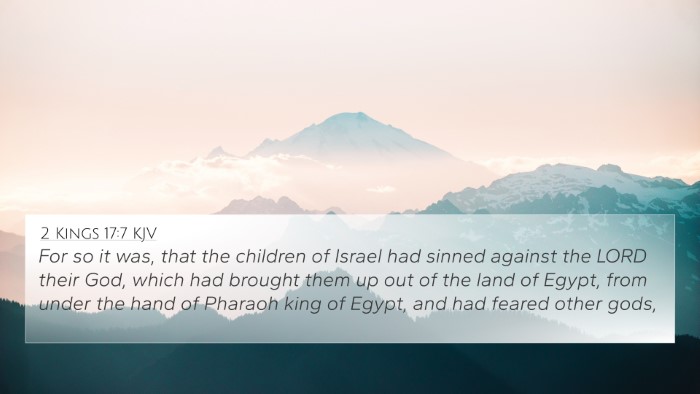
2 Kings 17:7 (KJV) »
For so it was, that the children of Israel had sinned against the LORD their God, which had brought them up out of the land of Egypt, from under the hand of Pharaoh king of Egypt, and had feared other gods,

Jeremiah 5:25 (KJV) »
Your iniquities have turned away these things, and your sins have withholden good things from you.
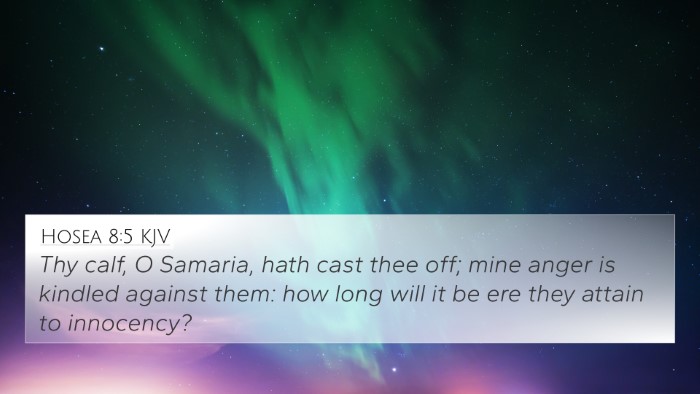
Hosea 8:5 (KJV) »
Thy calf, O Samaria, hath cast thee off; mine anger is kindled against them: how long will it be ere they attain to innocency?
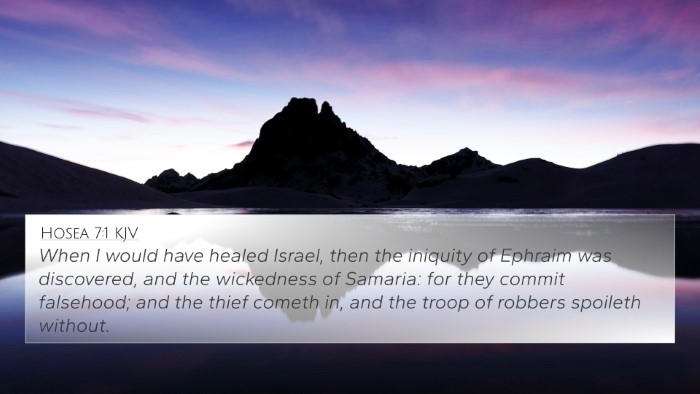
Hosea 7:1 (KJV) »
When I would have healed Israel, then the iniquity of Ephraim was discovered, and the wickedness of Samaria: for they commit falsehood; and the thief cometh in, and the troop of robbers spoileth without.

2 Kings 16:10 (KJV) »
And king Ahaz went to Damascus to meet Tiglathpileser king of Assyria, and saw an altar that was at Damascus: and king Ahaz sent to Urijah the priest the fashion of the altar, and the pattern of it, according to all the workmanship thereof.
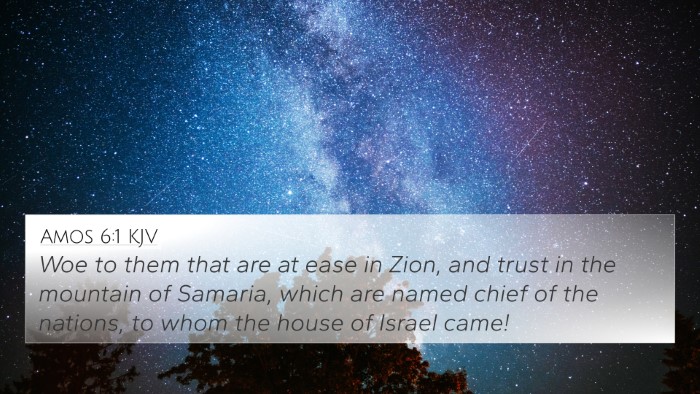
Amos 6:1 (KJV) »
Woe to them that are at ease in Zion, and trust in the mountain of Samaria, which are named chief of the nations, to whom the house of Israel came!

2 Kings 16:3 (KJV) »
But he walked in the way of the kings of Israel, yea, and made his son to pass through the fire, according to the abominations of the heathen, whom the LORD cast out from before the children of Israel.
Micah 1:5 Verse Analysis and Similar Verses
Understanding Micah 1:5
Micah 1:5 states: "For the transgression of Jacob is all this, and for the sins of the house of Israel: what is the transgression of Jacob? is it not Samaria? and what are the high places of Judah? are they not Jerusalem?"
Meaning and Context
This verse serves as a critical reflection on the sins of Israel and Judah. It emphasizes the consequences of their transgressions and the divine judgment that follows. Micah, a prophet in the 8th century BC, addresses both the northern kingdom of Israel (Samaria) and the southern kingdom of Judah (Jerusalem), highlighting the pervasive nature of sin in their societies.
Insights from Public Domain Commentaries
-
Matthew Henry:
Henry interprets this verse as a call to examine the root causes of Israel's downfall. He asserts that the prophet uses rhetorical questions to draw attention to the sins of the people, indicating that their transgressions are not only against God but also lead to societal decay.
-
Albert Barnes:
Barnes emphasizes the geographical references in the text, noting that Samaria and Jerusalem represent more than just physical locations; they symbolize the heart of sin and rebellion against God. He expounds that the high places in Judah were sites of idolatry, reflecting the spiritual corruption that pervaded the nation.
-
Adam Clarke:
Clarke goes further to explain the historical context, suggesting that the Israelites had deviated from their covenantal obligations. He highlights the idea of collective responsibility, suggesting that the sins of the leaders trickle down to the people, thus corrupting the entire nation.
Cross-References and Thematic Connections
To better understand Micah 1:5, it is essential to explore the following biblical cross-references:
- 2 Kings 17:22-23: Discusses Israel’s persistent sin leading to exile.
- Isaiah 1:1-4: A parallel call to Israel accusing them of rebellion against God.
- Jeremiah 3:6-9: Offers insights on Judah's infidelity and the role of idolatry.
- Ezekiel 18:30: Calls for Israel to repent from all their offenses.
- Hosea 4:1-2: Highlights the lack of faithfulness and truth in the land.
- Amos 3:14: Connects judgment to the corruption in the house of Israel.
- Deuteronomy 12:2-3: Refers to the destruction of high places in Canaan.
- Sophoniah 1:4-6: Speaks of judgment upon Judah and those who worship false gods.
- 1 Kings 14:22-24: Discusses Judah's sins and idolatry.
- Romans 1:24-25: A New Testament reflection on idolatry and God's judgment.
Conclusion
The implications of Micah 1:5 extend beyond its historical context, addressing issues of idolatry, sin, and corporate accountability, thereby enhancing our understanding through various cross-references. Such comparative Bible verse analysis aids in identifying connections between different scriptures, providing a more profound insight into the nature of divine judgment.
Tools for Further Study
For readers seeking to engage with Micah 1:5 and related verses more deeply, consider using:
- Bible concordance for locating key terms and their occurrences.
- Bible cross-reference guide to explore thematic connections.
- Cross-reference Bible study methods to identify inter-Biblical dialogues.
- Comprehensive Bible cross-reference materials for extensive research.
Final Thoughts
In studying the Scriptures, we uncover profound layers of meaning and cultural context. Understanding the connections between Bible verses—including those in Micah 1:5—illustrates how themes of sin, judgment, and the call to repentance resonate throughout both the Old and New Testaments. Engage with these verses through cross-referencing and thematic studies to enrich your Scripture engagement.

